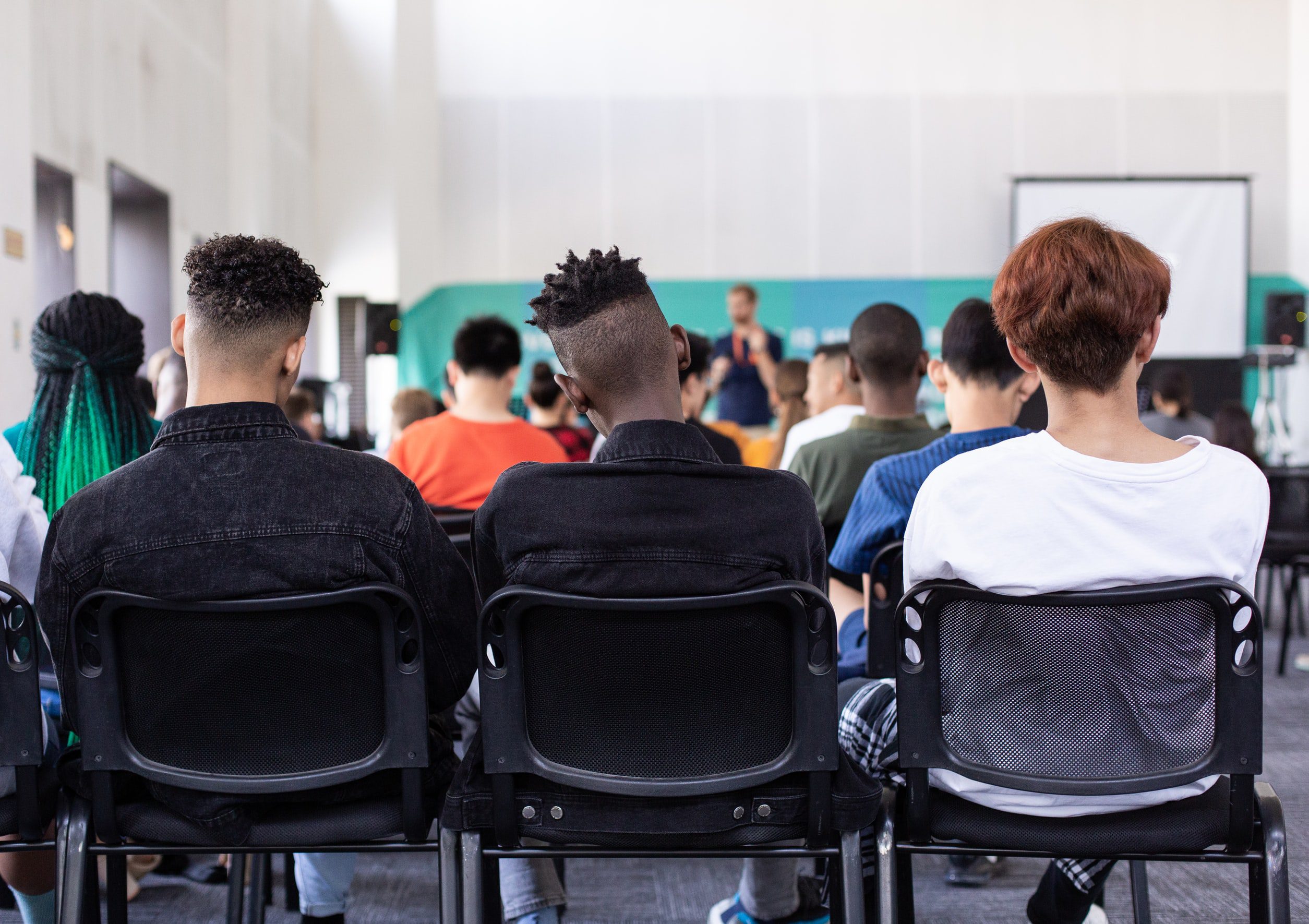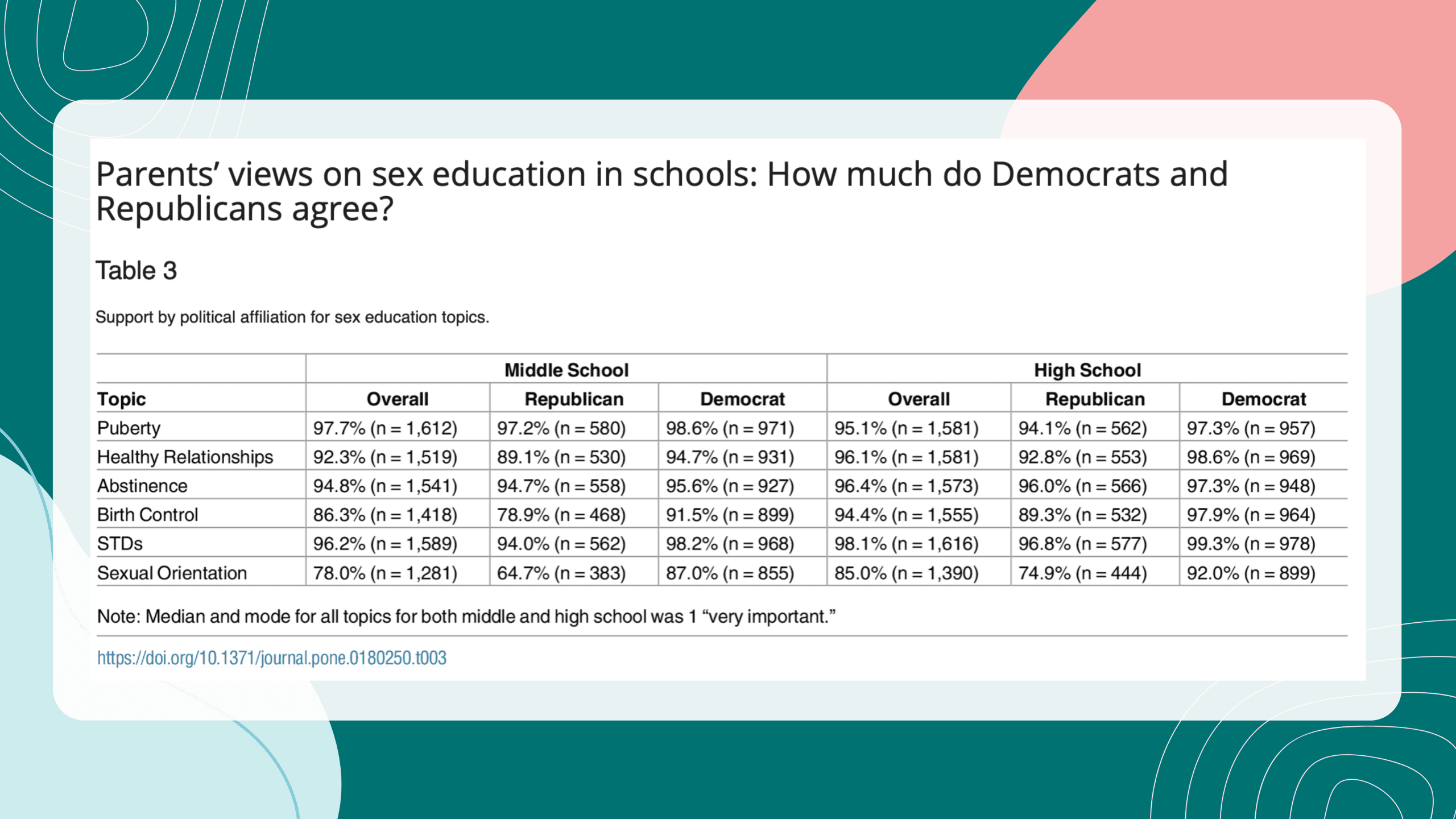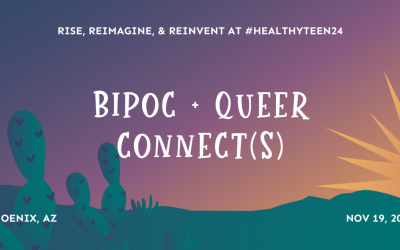
Young people have a right to quality, affirming sex education…and regardless of political affiliation, parents and young people agree

By Mariah Cowsert
May 1, 2021
Aworld where all young people lead healthy and fulfilling lives…that’s the dream, right? And it’s not controversial. Who couldn’t get behind healthy young people living fulfilling lives? But what does that mean? How do they get there?
Well, it means a lot of things…being “healthy” is a broad goal. So, what does it mean when it comes to sexual and reproductive health?
Young people have a right to live their authentic sexuality. That means making decisions about their own body and relationships—and feeling good doing it. Decisions about if, when, and how to parent—or not. And the freedom to become who they want to be.
To get here, young people must have access to comprehensive sex education. And guess what, that’s not controversial: regardless of political affiliation, most parents and adolescents support sex ed in schools. Indeed, the overwhelming majority agree!
Everybody Wants Young People to Have Sex Ed
According to a 2017 study of both Republican and Democratic parents, 93% of respondents reported supporting sexuality education in schools. Of these people, 89% wanted classes that covered puberty, healthy relationships, abstinence, sexually transmitted infections, and birth control, as showcased in the table below.

Sounds like a lot of parents want young people to have sex ed, right? In another study, all specific sex ed topics received majority support, 63.4%-98.6%, even those often thought to be controversial (e.g., birth control and sexual orientation). What’s more, most parents believed most topics should first be taught during the middle school years (which is, by the way, the age-appropriate time).
It’s our responsibility as adults and educators to ensure all young people have access to quality sex ed.
Equity and Access for All
Unfortunately, equity and access are a problem when it comes to who is able to get comprehensive sex education and where the curriculum is being implemented.
Too many young people—particularly those living in rural settings, communities of color, LGBTQ youth, immigrants, youth with lower incomes, youth with disabilities, and youth in care—aren’t getting the information and skills they need to make informed sexual and reproductive health decisions.
According to the Guttmacher Institute, only 30 states and the District of Columbia mandate sex education—with no guarantee that it is medically accurate, age-appropriate, or unbiased.
Fewer than half of all high schools and only 1 in 5 middle schools are teaching the so-called “essential” topics, which include HIV, STI, and pregnancy prevention, according to the Centers for Disease Control and Prevention.
Without sex ed, young people miss out on opportunities to demystify and debunk the things they’re already hearing and seeing from others and online.
Young people want and need to know about how to navigate not only sex but healthy relationships, gender and sexuality, sex positivity, consent, conflict resolution, and so much more.
It’s our responsibility as adults and educators to ensure all young people have access to the sex education and sexual and reproductive health care services they need to care for their own health and well-being. Sex ed prepares young people for life. It’s only sex ed if it’s comprehensive, affirming, and inclusive.
And Sex Ed Works!
Not only does support for sex ed exist, but we know sex ed works—the research is clear.
Numerous rigorous evaluations let us know that sex ed can help young people delay the onset of sexual activity, increase condom and contraceptive use, and reduce the number of sexual partners.
We already know that local, state, and federal education budgets are stretched thin. It only makes sense to be investing in sex education that has demonstrated effectiveness in achieving better outcomes for young people.
And no, talking about sex does not lead to an increase in sexual activity. This kind of “promiscuity propaganda” has been clearly debunked. Levels of sexual activity have actually been declining among young people; rather, public health experts suggest a range of factors behind the increase in STI rates, such as decreased prevention funding, declines in condom use, and lack of knowledge about STIs in general. In other words, we need more funding for high-quality sex ed.
What’s more…sex ed has benefits across a range of outcomes. Research also has shown that sex ed can have a transformational impact on school climate by utilizing intersectional approaches that affirm race, gender, and other aspects of identity.
Sex ed can be a vehicle for social change
Sex ed also has the power to change society and improve our health and well-being. The benefits are far-ranging, from safe and affirming environments and school climates to understanding systemic injustices and racism to teaching about consent and bodily autonomy.
Sex ed can have this transformational impact when it is…
Inclusive and Affirming
When young people have access to sex ed that is reflective of their experiences and identity (that means, being LGBTQ+ inclusive), it helps to create safe and affirming environments for LGBTQ+ young people. We see increased empathy among peers and reduced instances of bullying in schools. According to the GLSEN 2019 National School Climate Survey, LGBTQ+ students who attended schools with an LGBTQ-inclusive curriculum were much more likely to report that their classmates were somewhat or very accepting of LGBTQ+ people (66.9% vs. 37.9%).
Equitable
When sex education accurately and honestly teaches about the role that racism and other systemic injustices play in our social development and health in the U.S., young people can better advocate for themselves, their peers, and their communities towards a more equitable society.
Covers Healthy Relationships
When young people are taught how to practice consent, respect, and healthy communication, it allows them to better understand, recognize, and prevent sexual and relationship violence.
Teaches Bodily Autonomy and Respect
When young people are taught, early on, to respect the bodily autonomy of others—and understand their own—they learn that every person has the right to make their own sexual and reproductive health care decisions.
So Where Do We Go From Here?
Educators, parents, and guardians have a responsibility, an obligation, to ensure that young people have access to the information and skills they need to protect their health.
All young people—but particularly those living in rural settings, communities of color, LGBTQ youth, immigrants, youth with lower incomes, youth with disabilities, and youth in care—deserve sex ed that equips them with the information and skills they need to make informed decisions for themselves about sex and relationships.
What might this look like? One example is a collaborative project in Maryland called the Maryland Optimal Adolescent Health Program’s (MOAHP).
MOAHP brings together six local partners and county collaborators to use innovative approaches that will be implemented to advance the sexual health and well-being of youth in six rural Maryland counties—Allegany, Washington, Dorchester, Somerset, Wicomico, and Worcester. Rural counties often get overlooked in conversations about affirming sex ed or have stereotypes depicted of what they cover. Across the state, partners are working to implement the comprehensive sex ed curriculum, Positive Prevention PLUS. MOAHP also empowers young people in rural communities by involving youth on a youth advisory board and other activities, such as collaborating with youth brand ambassadors to develop the project voice and brand.
MOAHP is just one of the many examples of the work happening across the nation to improve equity and access in support of sex ed for all.
To champion and advocate for more efforts like MOAHP, for the third year in a row, Healthy Teen Network is proud to join a national coalition of sexual and reproductive health, rights, and justice organizations committed to ensuring an equitable and accessible national sex education program for all young people. May is Sex Ed for All Month.
Join us in celebrating Sex Ed for All Month by:
- Calling on public and elected officials to advocate for and invest in high-quality, sex education legislation that meets the full needs of young people;
- Telling us why you believe in Sex Ed for All (Tip: follow and use #SexEdForAll on social media and check out this tool kit for easy ways to promote #SexEdForAll);
- Supporting sex education programs that promote critical thinking, decision-making, self-esteem, and self-efficacy and provide young people with the full information they need and have the right to; and
- Attending the #SexEdForAll events:
- Youth Town Hall, Tuesday, May 4th, 2021, 3:30-5 PM ET
- State Legislative Briefing on Friday, May 21st, 2021, 2-3 PM ET
- Federal Congressional Briefing (date TBD)
Mariah brings an artistic lens to nonprofit communications in her role as Digital Content Creator. With the bulk of her experience working in social services and at affordable housing organizations—she has a passion for diving deeper into (and helping bridge the gap between) health care and housing. In her free time, Mariah can be found tending to her growing jungle of houseplants, making collage and textile art, reading Mary Oliver poems in nature, and experimenting with new vegetarian recipes. Read more about Mariah.












